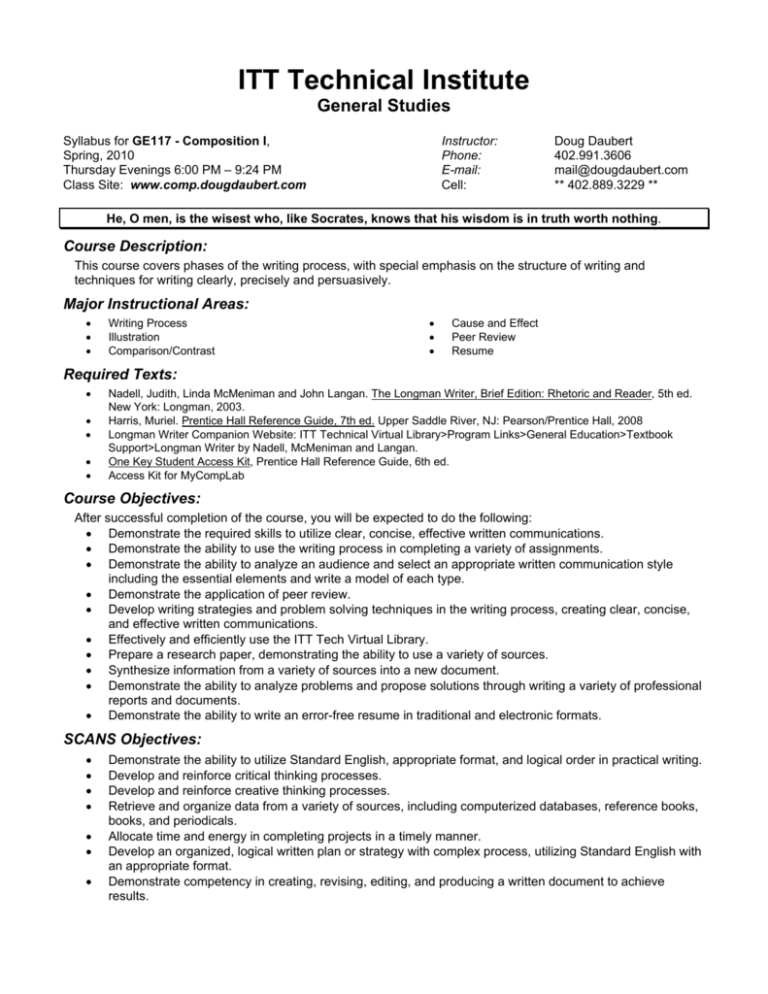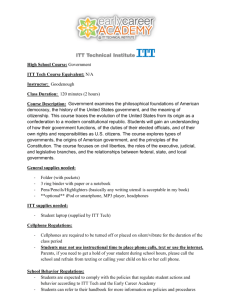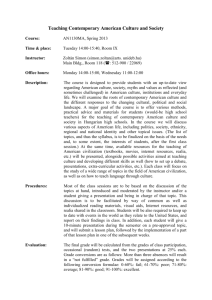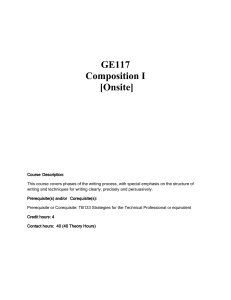
ITT Technical Institute
General Studies
Syllabus for GE117 - Composition I,
Spring, 2010
Thursday Evenings 6:00 PM – 9:24 PM
Class Site: www.comp.dougdaubert.com
Instructor:
Phone:
E-mail:
Cell:
Doug Daubert
402.991.3606
mail@dougdaubert.com
** 402.889.3229 **
He, O men, is the wisest who, like Socrates, knows that his wisdom is in truth worth nothing.
Course Description:
This course covers phases of the writing process, with special emphasis on the structure of writing and
techniques for writing clearly, precisely and persuasively.
Major Instructional Areas:
•
•
•
Writing Process
Illustration
Comparison/Contrast
•
•
•
Cause and Effect
Peer Review
Resume
Required Texts:
•
•
•
•
•
Nadell, Judith, Linda McMeniman and John Langan. The Longman Writer, Brief Edition: Rhetoric and Reader, 5th ed.
New York: Longman, 2003.
Harris, Muriel. Prentice Hall Reference Guide, 7th ed. Upper Saddle River, NJ: Pearson/Prentice Hall, 2008
Longman Writer Companion Website: ITT Technical Virtual Library>Program Links>General Education>Textbook
Support>Longman Writer by Nadell, McMeniman and Langan.
One Key Student Access Kit, Prentice Hall Reference Guide, 6th ed.
Access Kit for MyCompLab
Course Objectives:
After successful completion of the course, you will be expected to do the following:
• Demonstrate the required skills to utilize clear, concise, effective written communications.
• Demonstrate the ability to use the writing process in completing a variety of assignments.
• Demonstrate the ability to analyze an audience and select an appropriate written communication style
including the essential elements and write a model of each type.
• Demonstrate the application of peer review.
• Develop writing strategies and problem solving techniques in the writing process, creating clear, concise,
and effective written communications.
• Effectively and efficiently use the ITT Tech Virtual Library.
• Prepare a research paper, demonstrating the ability to use a variety of sources.
• Synthesize information from a variety of sources into a new document.
• Demonstrate the ability to analyze problems and propose solutions through writing a variety of professional
reports and documents.
• Demonstrate the ability to write an error-free resume in traditional and electronic formats.
SCANS Objectives:
•
•
•
•
•
•
•
Demonstrate the ability to utilize Standard English, appropriate format, and logical order in practical writing.
Develop and reinforce critical thinking processes.
Develop and reinforce creative thinking processes.
Retrieve and organize data from a variety of sources, including computerized databases, reference books,
books, and periodicals.
Allocate time and energy in completing projects in a timely manner.
Develop an organized, logical written plan or strategy with complex process, utilizing Standard English with
an appropriate format.
Demonstrate competency in creating, revising, editing, and producing a written document to achieve
results.
References and Resources:
ITT Tech Virtual Library:
Login to the ITT Tech Virtual Library (http://www.library.itt-tech.edu/) to access online books, journals, and other
reference resources selected to support ITT Tech curricula.
•
•
•
•
•
•
•
•
•
•
•
General References
ITT Technical Virtual Library>Periodicals>EbscoHost
ITT Tech Virtual Library>Reference Resources>Grammar, Writing, and Style>APA Style
ITT Tech Virtual Library>Reference Resources>Grammar, Writing, and Style>11 Rules of Writing
ITT Tech Virtual Library>Reference Resources>Grammar, Writing, and Style>Guide to Grammar and
Writing
ITT Tech Virtual Library>Reference Resources>Grammar, Writing, and Style>Online Writing Lab at Purdue
University
ITT Tech Virtual Library>Reference Resources>Grammar, Writing, and Style>Paradigm Online Writing
Assistant
ITT Tech Virtual Library>Reference Resources>Grammar, Writing, and
Style>Plagiarism: What It is and How to Recognize and Avoid It
ITT Tech Virtual Library>Reference Resources>Grammar, Writing, and Style>Research and Argument:
Tools for Teachers and Students
>Program Links>General Education >Link Library>GE117 Composition I
>Program Links>Textbook Support > The Longman Writer, Brief Edition: Rhetoric and Reader, 5th ed.
Companion Website: http://wps.ablongman.com/long_nadell_writer_5
Books
Armstrong, Thomas. Reading and Writing : Making the Words Come Alive. Alexandria, VA: Association for
Supervision & Curriculum Development, 2003.
Campbell, Katy. E-ffective Writing for E-Learning Environments. Hershey, PA: Idea Group Inc., 2003.
Danziger, Elizabeth. Get to the Point : Painless Advice for Writing Memos, Letters and E-Mails Your
Colleagues and Clients Will Understand. Hampton Roads, VA: Harmony Books, 2001.
Dikel, Margaret. Guide to Internet Job Searching 2004-2005. NY: McGraw-Hill, 2004.
Hancock, Elise and Robert Kanigel. Ideas into Words. Baltimore, MD: The Johns Hopkins University Press,
2003.
Lillis, Theresa M. Student Writing: Access, Regulation, Desire. NY: Routledge, 2001.
Marcus, John. The Resume Makeover: 50 Common Problems With Resumes and Cover Letters - and How
to Fix Them. NY McGraw Hill Trade, 2003.
Public Library Association Staff VGM Career Books (Firm) Staff. Guide to Basic Resume Writing. NY:
McGraw-Hill, 2003.
Rozakis, Laurie E. Complete Idiot's Guide to College Survival. NY: Alpha Books, 2001.
. Complete Idiot's Guide to Grammar and Style. Alpha Books, 1997.
. Schaum's Quick Guide to Writing Great Research Papers. NY: McGraw-Hill Professional Book Group,
1999.
Short, Carroll Dale. Writer's Tool Kit. Montgomery, AL: Court Street Press, 2001.
Turley, Richard Marggraf. Writing Essays : A Guide for Students in English & the Humanities. NY:
Routledge, 2000.
Publisher Resources: MyCompLab at: www.mycomplab.com
Evaluation and Grading:
Course Requirements:
1. Attendance and Participation: Regular attendance and participation are mandatory for satisfactory
progress in this course.
2. Completed Assignments / Exercises: Each student is responsible for completing all assignments on
time. Due dates will be printed on assignments and exercises. Late assignments will have grades reduced.
3. Team Participation: Each student is responsible for participating in team assignments and for completing
the delegated task (part of the “Discussion Forum”). Each team member must honestly evaluate the
contributions by all members of their respective teams.
4. Reading Assignments: Students are expected to have assigned reading completed before class time.
Many in-class activities and “Discussion Forum” activates are centered around reading assignments.
5. Peer Editing: Peer editing is a vital part of this class.
Evaluation Criteria Table:
The final grade will be based on the following weighted categories:
CATEGORY
Discussion Forum
Exercises
Written Assignments
Project Part 2
Project Part 3
Project Part 5
Total
WEIGHT
20%
15%
30%
7%
8%
20%
100%
Grade Conversion Table
Final grades will be calculated from the percentages earned in class as follows:
A
90 - 100%
4.0
B+
85 - 89%
3.5
B
80 - 84%
3.0
C+
75 - 79%
2.5
C
70 - 74%
2.0
D+
65 - 69%
1.5
D
60 - 64%
1.0
F
<60%
0.0
Participation consists of clarifying content questions or questions that require students to apply what they have
learned. Students will be graded on their participation in the discussions as well as the quality of their responses.
** Only students present and participating in discussion will earn points for “Discussion Forum.” **
•
•
•
•
•
Students participating in the entire class may earn up to 100% for discussion forum
Students participating in half the class may earn no more than 50% for discussion forum
Students missing the entire class will earn 0% for discussion forum.
Students who contact the instructor prior to class will earn 25% for discussion forum
Instructor will adjust discussion forum points for student based on participation in class
The instructor may assign a make-up writing assignment to students absent.
The instructor may select any of following techniques or a combination of the following to evaluate the
discussions. The instructor may also develop other methods of evaluation. Please note the points allocated
should be a guide to select the technique. It is recommended that the instructor use different techniques for
different discussions.
Divide into small groups.
•
•
•
•
•
•
Each small group will summarize the discussion.
Each individual will summarize the small group discussion.
Each individual will delineate the different points made and will state his/her opinion and defend.
Each small group will make a presentation to the full class.
Each small group will make a presentation to another group and the send group will evaluate the
presentation.
Using small group evaluation form, small group members will complete peer evaluation
o Peer Evaluation and Group Process Evaluation forms are included in the Appendix. These forms
may be used to evaluate group discussions. The instructor may choose to create or use alternate
forms. It is recommended that the instructor use student evaluation as part of the grade criteria for
group discussion.
Class Discussion
•
•
Each individual will summarize the class discussion.
Each individual will delineate the different points made in class discussion and will state his/her opinion and
defend.
Academic Dishonesty / Plagiarism:
Academic dishonesty and/or plagiarism will not be tolerated in this class or at ITT Technical Institute. If I suspect
plagiarism I will inform my supervisor and take necessary action, up to and including failing the assignment,
failing the entire course, being expelled from ITT Technical Institute.
Cell Phones / PDA’s / Computers:
No phone calls, texting or web browsing or any other use of cell phones during class time. If you have an
emergency call, please step in to the hallway to answer your phone.
Classroom Rules:
Everyone treated with respect.
One person talks at a time.
Inappropriate use of classroom time:
Students using classroom time inappropriately will be asked to leave. Students removed from class will receive
an “F” or “0%” for the “Discussion Forum” that week.
Inappropriate use of classroom time includes, but is not limited to: surfing the web, talking while the instructor or
other students are talking, texting, use of cell phone, sleeping in class, doing homework or projects for other
classes, etc..
Late Work / Missed Assignments:
Your instructor has set up a web site with all assignments available for download and printing. If you are absent
from class, please visit the web site to get missed assignments.
http://www.comp.dougdaubert.com
Due dates will be printed on all assignments / exercises. Late assignments will have grades reduced
appropriately. Missed assignments / exercises will be entered as an “F” or a “0%” on your grade reports. The
absolute last day to turn in late assignments will be beginning of class, Week #9.
Course Outline:
Unit #
1. Getting Started
2. Planning,
Invention, Tone and
Audience
Activities for the unit
• Read:
o Longman Writer pp. 15–35
o PH Ref. Guide pp. 6–13
• Exercise:
o Written Assignment: “Week 1: Brainstorming”
•
•
Read
o Longman Writer pp. 21–24
o PH Ref. Guide pp. 2–4 (stop at Medium) and pp. 5–6 (start at
Thesis)
Exercise:
o
3. Topic Sentences to
Organizational
Strategies
•
•
Read
o Longman Writer pp. 55–60
o PH Ref. Guide p. 13 and pp. 17–20
Exercise:
o
4. Research and
Revision
•
•
•
•
Written Assignment: "Childhood 1st Draft"
Exercise: "Discussion-Challenge"
Read
o Longman Writer pp. 54–60
o PH Ref. Guide pp. 20–24 and review pp. 17–18
Exercises:
o
5. Thesis Statements
and Evidence
Written Assignment: "Letters
Written Assignment: "Childhood 2nd Draft"
Exercise: "Search Forum"
Exercise: "Discussion - Virtual Library”
Read
o Longman Writer pp. 38–43, pp. 46–52
Exercises:
o Written Assignment: "Childhood Final Draft"
Written Assignment: "Thesis Draft"
Exercise: "Discussion - Thesis"
6. Citation, Plagiarism
and Patterns of
Development
•
•
Read
o Longman Writer pp. 31–32, pp. 378–386, pp. 518–519
o PH Ref. Guide pp. 410–415, pp. 378–381, pp. 25–26
Exercise:
o Written Assignment: "Longman Assignment"
Exercise: "Discussion - Plagiarism"
In-class Exercise: "Worksheet: plagiarism"
•
Project: Submit Part 1: Selecting and Narrowing the Topic
7. Descriptive Writing
and Illustration
•
•
•
8. Writing to Impress
and Resume Writing
•
•
•
9. Compare and
Contrast and
Narration
•
Read
o Longman Writer: pp. 155–162, pp. 231–236, pp. 76–82
o PH Ref. Guide: pp. 406–407
Exercise:
o Written Assignment: "Audience, Purpose, POV"
Project: Submit Part 2: Declaring Your Audience, Research, and
Thesis Statement, due Week #8
Read
o PH Ref. Guide: pp. 212-217 and pp. 218 (start at Clichés)–
228, pp. 88–98
Exercises:
o Written Assignment: "Resume”
Project: Part 3: Draft, due Week #9
•
•
Read
o Longman Writer: pp. 193–202, pp. 344–352,
o PH Ref. Guide: pp. 416–446
Exercises:
o Written Assignment: "Blending"
Project: Part 4: Revision (ungraded), due Week #10
Note: Last day to turn in missed assignments!
10. Process Analysis
and your Research
Paper Checklist
•
•
•
Read
Longman Writer: pp. 303–311, pp. 79–81,
PH Ref. Guide: pp. 407–408
11. Last Class!
•
Project: Submit Part 5: Refinement
•

![Submission 68 [doc]](http://s3.studylib.net/store/data/008000926_1-fed8eecce2c352250fd5345b7293db49-300x300.png)





